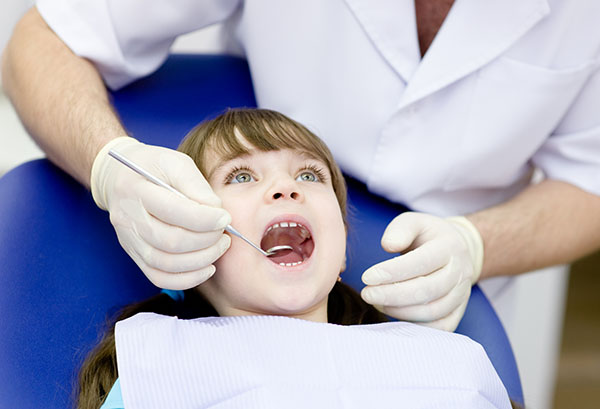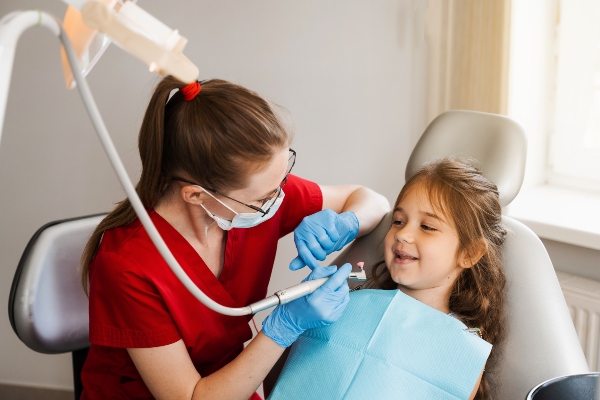Sedation Dentistry for Kids

You might be considering sedation dentistry for kids if your young one if uncomfortable with the idea of being in a dental chair while someone prods their mouth. Dental anxiety is a serious issue that affects people of all ages, and it can get worse as a person ages if it is not overcome.
When is sedation dentistry for kids used?
There are a variety of situations when sedation dentistry for kids is recommended. For example, if the child has a hard time staying still while being worked on, dental sedation can be used to make treatments less stressful for the child.
Sedation dentistry is also recommended for children with special needs. It curbs spontaneous motions and makes the child more cooperative.
Common types of sedatives used by pediatric dentists
Most dentists will provide parents with several options when it comes to sedatives. Each type of sedative has its pros and cons and it often comes down to the how uncomfortable the child it, how long the procedure will take and the child's medical history.
Certain types of sedatives allow the kid to communicate, cooperate and follow instructions. These include:
1. Nitrous oxide
Most people know this compound as laughing gas. It is used by dentists to calm patients who are uncomfortable with dental treatments. Nitrous oxide is a gas that is delivered to the patient through a mask that is placed over the kid's nose.
The gas is combined with oxygen to ensure the child can breathe comfortably during the procedure.
Nitrous oxide is a fast-acting gas and it only takes a few minutes before the patient starts to experience its effects. It makes the patient relaxed, happy and euphoric. Once the procedure is over, the dentist will pump pure oxygen through the mask to ensure the nitrous oxide is completely eliminated from the kid's body.
Nitrous oxide can make some people feel nauseous so it is best to avoid eating anything major before taking the child in for the appointment.
2. Oral sedation
Oral sedation can be used to calm and relax children who feel anxious during dental treatments or have a hard time controlling their muscles. An oral sedative can come in various forms like pills, liquids and tablets.
When taken, it makes the child feel drowsy and relaxed.
Parents should prepare their child for oral sedatives by limiting fluid and food consumption before the appointment, dressing the child in loose clothing and making plans to monitor the child after the treatment.
As is the case with nitrous oxide, oral sedatives might make the child feel nauseous.
3. General anesthetics
This is often the last resort since it puts the child in a state of deep sleep. It is rarely used except for cases where:
- The treatment cannot be performed safely without general anesthesia
- The procedure is very lengthy
- The kid has a condition that limits their ability to follow instructions and cooperate
Get started today!
Dealing with a child who is terrified about getting dental treatments? Talk to a pediatric dentist about sedatives today. They will be happy to educate anyone on the safety and efficacy of sedation dentistry for kids.
Request an appointment here: https://www.hvkidsmiles.com or call Hudson Valley Pediatric Dentistry at (845) 363-4177 to schedule an appointment in our Middletown office.
Check out what others are saying about our services on Yelp: Read our Yelp reviews.
Recent Posts
Dental fillings are a key part of protecting children’s oral health. When prevention efforts fail, this simple procedure stops cavities from doing further damage to dental health. Here, we take a closer look at the benefits of treating childhood tooth decay with dental fillings for kids.According to the Centers for Disease Control and Prevention (CDC),…
Cavities are a common dental health issue, and as kids learn to care for their teeth, they are often more prone to developing them. Dental fillings for kids can help avoid future oral health complications and protect their young smiles. Here are the basics of the treatment process that you should know as a parent…
Curious about dental fillings for kids? Read on to learn more. As your kid ages, you most likely have many questions about their overall health. Questions like "Are dental fillings for kids necessary?" or "What happens to baby teeth with nontreated cavities?" These are crucial questions to think about, and this article addresses them so…
Lip tie laser surgery can sound like a modern, gentler option, while a scissor frenectomy often feels simpler and more familiar. Both approaches aim to release a restrictive upper labial frenulum when symptoms and clinical findings support treatment. A pediatric dental evaluation should focus on function first, since many frenula look prominent but cause no…


